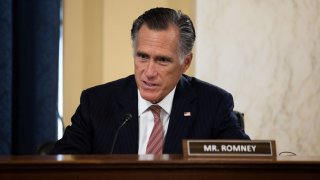
- GOP Sen. Mitt Romney unveiled a plan to give households up to $4,200 annually for each young child, offering a Republican answer to President Biden's calls for more support to families with children.
- While Romney is calling for even more aid than Biden is, his plan would simultaneously eliminate a number of popular welfare programs.
- Romney's plan would provide monthly cash payments of $350 for each child under six and $250 per month — $3,000 per year — for each child from age 6 to 18.
Sen. Mitt Romney, R-Utah, on Thursday unveiled a plan to give households up to $4,200 annually for each young child, offering a Republican answer to President Joe Biden's calls for more support to families with children.
While Romney is calling for even more aid than Biden is, his plan would simultaneously eliminate a number of popular welfare programs, which could be a hurdle to gaining support from Democrats.
Romney's plan would provide monthly cash payments of $350 for each child under 6 and $250 per month — $3,000 per year — for each child age 6 to 18. Families would become eligible four months before each child's due date, meaning the household would receive $1,400 before the child is born.
It's unclear whether other Republicans or Democrats will line up behind Romney's plan, and the senator's office did not respond to inquiries about whether he had discussed the proposal with other lawmakers or the White House. The plan gained early support from moderate and progressive think tanks.
Biden has also proposed upping the allowance provided to Americans with children, doing so in his $1.9 trillion American Rescue Plan proposal. The American Rescue Plan calls for increasing the child tax credit so that households would receive $3,600 for each child under 6 and $3,000 for older children.
Under current law, the child tax credit provides $2,000 per year for children up to 16 years old and is paid out yearly. The tax credit doesn't apply to those making less than $2,500 per year.
Money Report
Romney's plan would phase out for those making more than $200,000 and for joint filers making more than $400,000 and would be capped at $1,250 per month. The phase-out level for Biden's plan hasn't been disclosed.
Romney, the 2012 GOP nominee for president, is part of a group of 10 Republicans that has called for Biden to reduce the size of his $1.9 trillion Covid-19 relief plan.
As part of his plan, the Utah Republican would scrap Temporary Assistance for Needy Families, the Child and Dependent Care Credit, and the state and local tax, or SALT, deduction, a sticking point for Democrats who represent wealthy areas and those with high tax rates.
Congress capped the SALT deduction as part of former President Donald Trump's 2017 tax reform legislation. Democrats have pressed to eliminate the cap, which prevents filers from claiming more than $10,000 in state and local taxes on their federal returns.
Romney touted the plan on Thursday, saying it would lift nearly 3 million children from poverty without adding to the deficit.
Under Romney's proposal, the benefits would be distributed each month via the Social Security Administration. The push for direct payments in welfare programs has been accelerated by the perceived success of the checks sent out to provide relief during the pandemic. Romney was an early supporter of direct payments, calling for $1,000 checks to every adult in March.
Senior Democrats did not provide comment on Romney's plan on Thursday.
Rosemary Boeglin, a White House spokesperson, said that the administration welcomed Romney's focus on cutting child poverty. She said Biden's plan called for providing relief on an emergency basis through 2021. Boeglin added that Biden wanted to work with Romney and others to formulate a bipartisan plan to provide assistance on a permanent basis, and to pay for it.
The Niskanen Center, a moderate think tank in Washington, wrote in a fact sheet released alongside Romney's plan that the child allowance would cut child poverty in the U.S. by a third and "deep child poverty" by half. The think tank analysis supported Romney's contention that his plan would not increase the deficit.
Two analysts at the center, Samuel Hammond and Robert Orr, also published a paper, "The Conservative Case for a Child Allowance," in which they argued that such a plan would "create the conditions necessary to consolidate a variety of less effective policies and programs, including those known to encourage dependency and penalize marriage."
On the other side of the aisle, Matt Bruenig, an analyst and the founder at the People's Policy Project, a progressive think tank, also came out in support of Romney's plan, calling it a step up from Biden's.
"Based on the benefit design alone, it's clear that Romney's proposal, due to its generosity and administrative simplicity, is an improvement on the Biden proposal," Bruenig, who called for a more expansive child allowance in a white paper published last month, wrote in a blog post.
Bruenig found that the lifetime benefit per child would be $57,600 under Biden's plan, compared with $62,600 under Romney's plan. The child tax credit, as it is, provides a lifetime benefit of $34,000 per child, Bruenig wrote.
The calls for upping aid to families with children come as the U.S. wrestles with a child poverty rate well above the average for wealthy countries. About 17% of children in the U.S. — or 12 million kids — lived in poverty as of 2019, a number that had been slightly declining before the Covid-19 pandemic, according to the Kids Count project at the Annie E. Casey Foundation.
The financial toll from the pandemic has increased the strain on families with children and left millions out of work.
In a post on Twitter on Thursday, Romney wrote that families "are facing greater financial strain and marriage and birth rates are at an all-time low.
"Now is the time to help families meet the challenges they face as they take on most important work any of us will ever do — raising our society's children," he wrote.
Subscribe to CNBC Pro for the TV livestream, deep insights and analysis on how to invest during the next presidential term.






